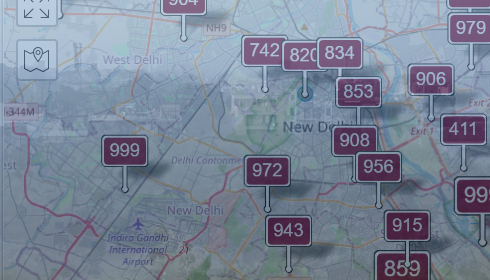
Delhi's Air Quality Plummets: CAQM Invokes Stage-III of GRAP Immediately
The Commission for Air Quality Management (CAQM) Sub-Committee on the Graded Response Action Plan (GRAP) has invoked Stage-III of the revised GRAP across the National Capital Region (NCR) with immediate effect. This decision comes as Delhi's air quality continues to deteriorate, with the Air Quality Index (AQI) breaching the 350 mark and reaching 371 at 4 PM, according to the Central Pollution Control Board (CPCB). The Sub-Committee met today to assess the overall air quality scenario, considering meteorological forecasts provided by the India Meteorological Department (IMD) and the Indian Institute of Tropical Meteorology (IITM). Given the prevailing conditions, including dense fog, low mixing height, and variable winds, the committee determined that the worsening trend is likely to persist.
In light of these concerns, the Sub-Committee has mandated the immediate implementation of all measures under Stage-III of the revised GRAP, categorized as 'Severe' air quality (AQI 401-450). These measures supplement those already in place under Stages I & II of GRAP. Relevant agencies, including Pollution Control Boards of NCR and the Delhi Pollution Control Committee (DPCC), have been instructed to enforce these actions strictly.
Stage-III of GRAP introduces a comprehensive 9-point action plan aimed at curbing air pollution. A key focus is stringent restrictions on construction and demolition (C&D) activities, which are significant contributors to airborne particulate matter. Prohibited activities include earthwork for excavation, piling, demolition, open-trench sewer and drainage work, masonry, painting, and large-scale welding. While minor indoor repair work is permitted, road construction, transfer of dust-generating materials, and vehicle movement on unpaved roads are restricted. Exemptions apply to critical infrastructure projects, such as metro rail services, national security-related activities, healthcare facilities, and sanitation projects. Additionally, all stone crushers and mining operations in the NCR must cease immediately.
Another key measure under Stage-III is the restriction on vehicle movement. The NCR state governments and the Government of the National Capital Territory of Delhi (GNCTD) will enforce limits on BS-III petrol and BS-IV diesel light motor vehicles (LMVs) in Delhi and select districts, including Gurugram, Faridabad, Ghaziabad, and Gautam Budh Nagar. Certain exceptions will be made for vehicles carrying essential goods and services, as well as adapted vehicles for persons with disabilities. The entry of BS-IV and below diesel-operated light commercial vehicles (LCVs) registered outside Delhi will also be restricted.
Educational institutions will be affected as well. Schools in Delhi and designated NCR districts will be required to conduct classes for students up to Class V in a hybrid mode, offering both physical and online options. The option to attend online classes will be left to students and their guardians. Additionally, staggered office hours for public offices and municipal bodies are encouraged to reduce vehicular emissions. The central government may also consider similar measures for its offices in Delhi-NCR.
CAQM has urged citizens to actively participate in pollution control efforts. The Citizen Charter under GRAP advises individuals to walk or cycle for short trips, use public transport or carpool, work from home where possible, and avoid using coal and wood for heating. Households are encouraged to provide electric heaters to security staff to prevent open burning of biomass.
With Stage-III measures now in effect, authorities aim to mitigate the severe air pollution crisis in the NCR. However, continued vigilance and cooperation from both governmental agencies and citizens will be crucial in ensuring compliance and improving air quality in the region.